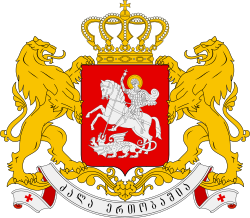 |
|---|
This article needs additional citations for verification .(July 2025) |
Democratic Front was an opposition faction in Parliament of Georgia. [1] Democratic Front is coalition of the Republican Party of Georgia, the Conservative Party of Georgia and some non-party MPs. Democratic Front is chaired by David Zurabishvili, former member of Liberty Institute.